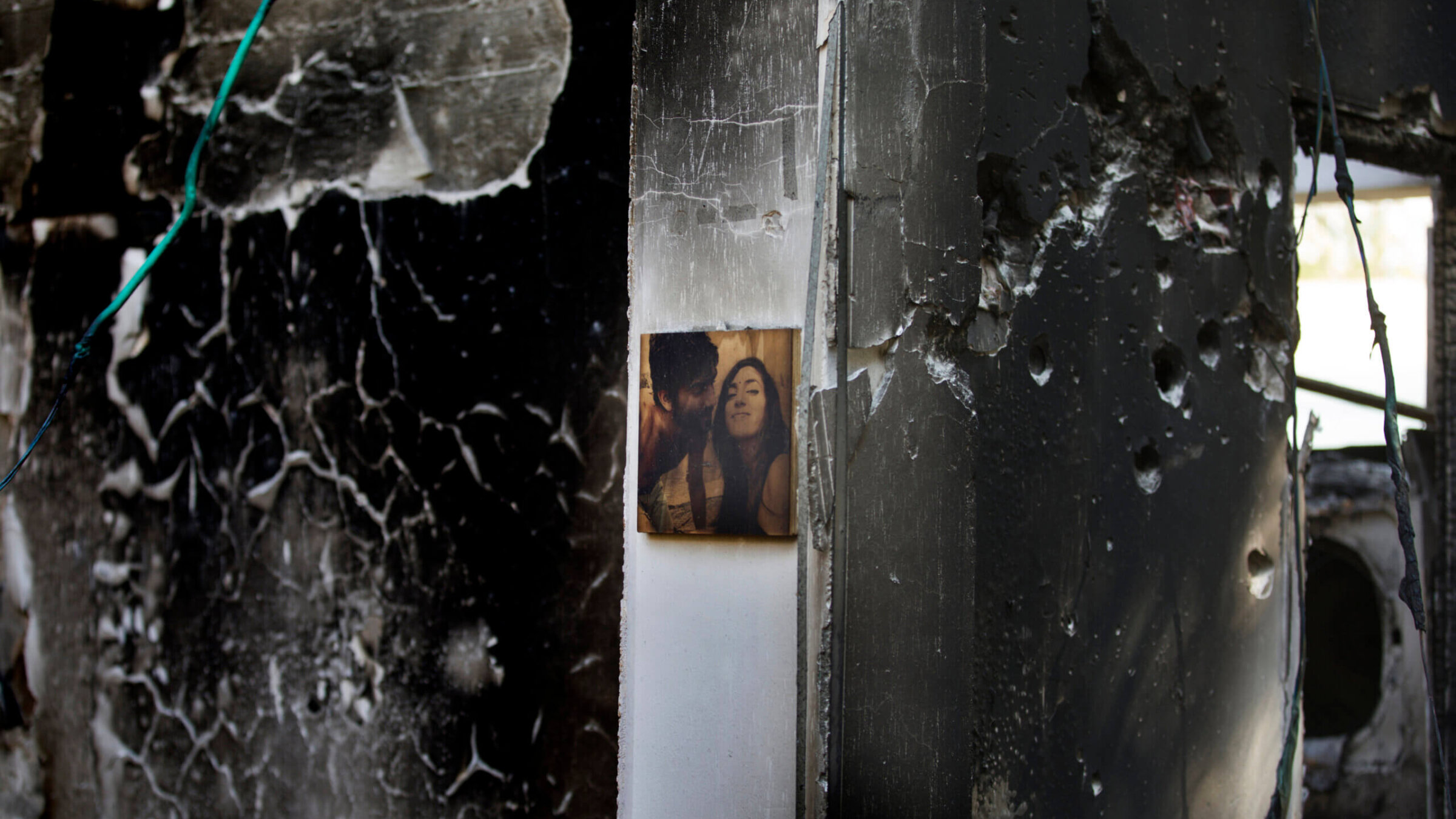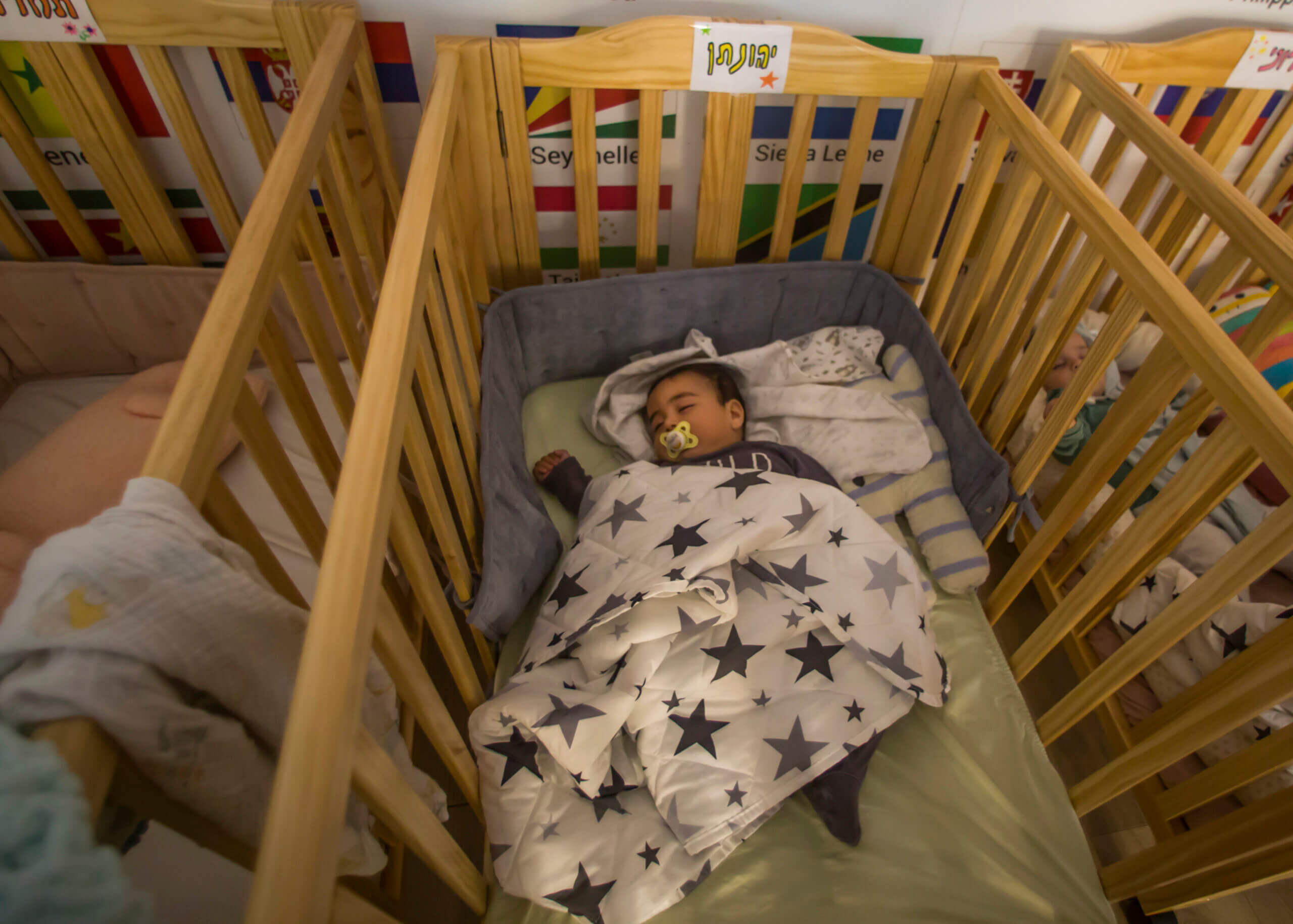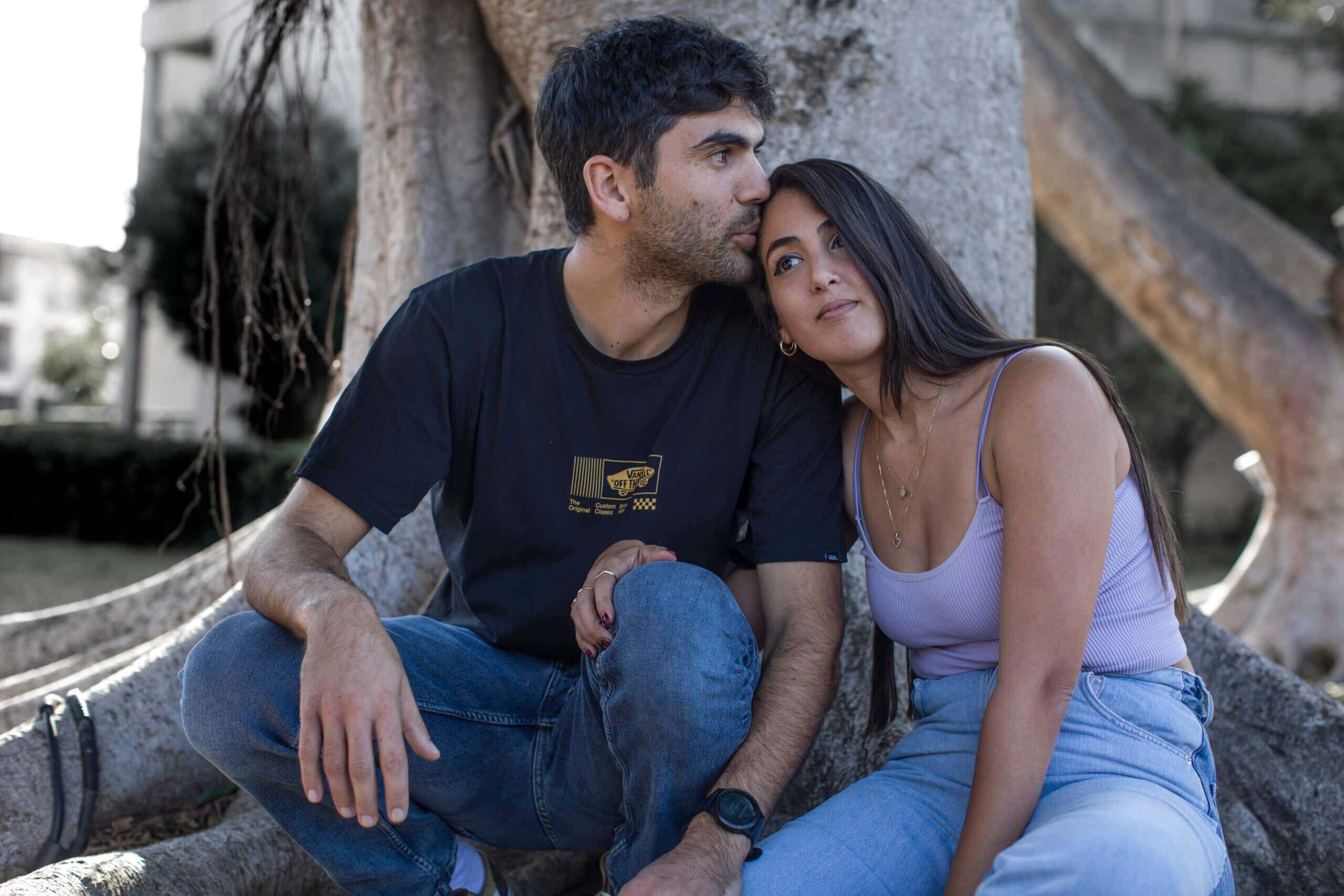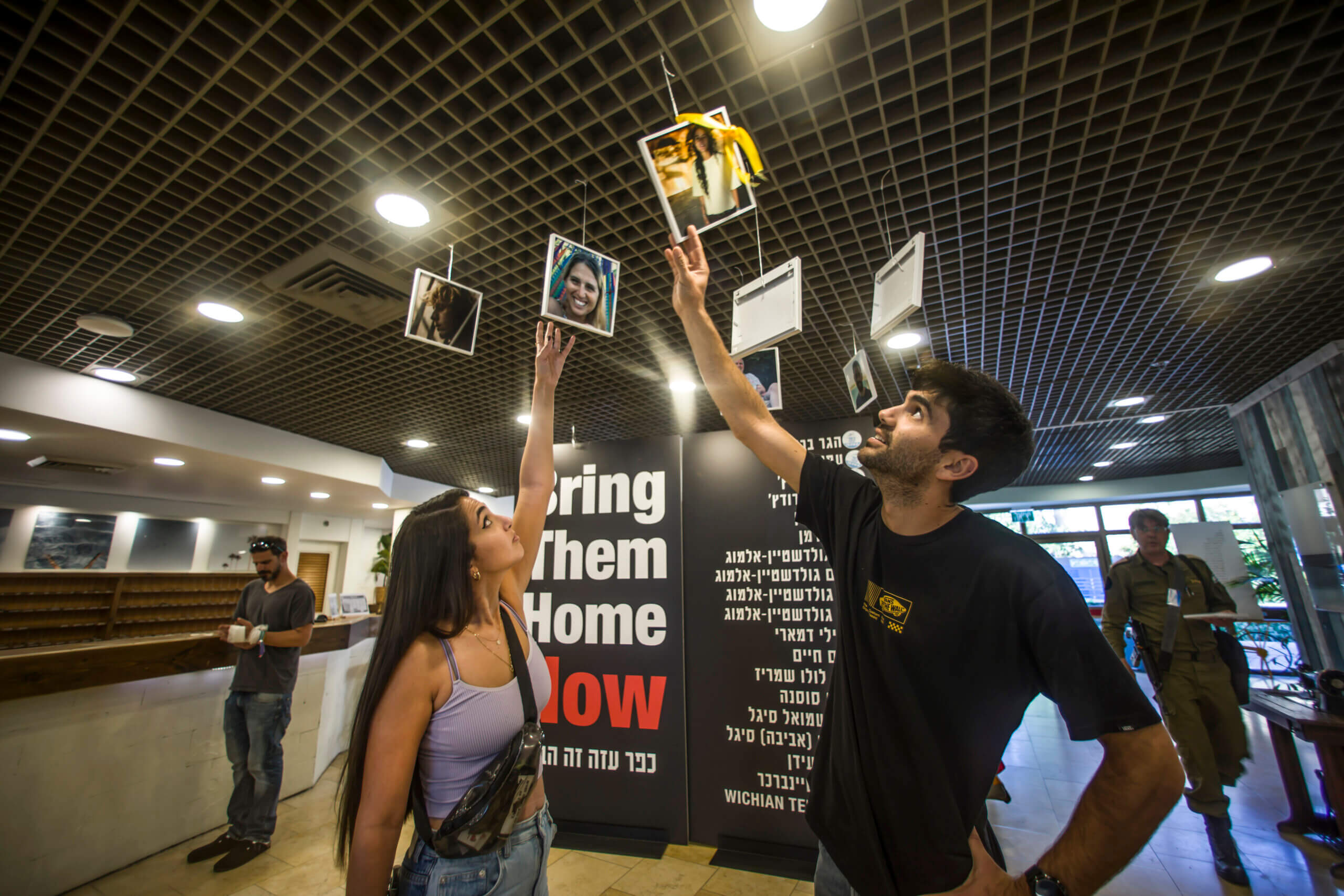Looking Forward‘People thought we were dead’: They spent 27 hours under fire from Hamas — then Netanyahu used their home for an Elon Musk photo op
How YouTube cartoons, a child’s comb, Bamba and psalms helped a young family survive Oct. 7

After their home was destroyed in the Oct. 7 attack, a photograph of Doron and Itamar Cohen remained intact on the wall — touched by fire, but not burned. Photo by Rina Castelnuovo
SHEFAIM, Israel — Dorin and Itamar Cohen were seething as they watched the video of Prime Minister Benjamin Netanyahu and Elon Musk touring their torched home on Kibbutz Kfar Aza.
Not just because the couple holds Netanyahu partly responsible for the 27 hours they spent shuddering in their tiny safe room with their 3-year-old son, Adam, and baby, Jonathan, as Hamas terrorists set the house aflame. Not because of Musk’s antisemitic posts on X.
They’re infuriated because the politician and the billionaire did not ask their permission before tromping through the charred remains. Because they never asked what happened there.
“It’s not just walls — this is our life,” Dorin Cohen, who is 30, told me as we sat in the grassy courtyard of Hotel Shefaim, where most of Kfar Aza has been relocated. “We felt like it doesn’t matter what we’ve been through, it’s just a good picture.”
The world is awash with the story of Oct. 7 and its aftermath. It is one giant story of a century-old conflict over land and identity — and it is thousands of individual stories of humanity tested beyond comprehensible limits.
Stories of hostages and the parents and partners they left behind. Stories of soldiers called up for Israel’s unprecedented retaliatory assault on the Gaza Strip and of Palestinian families destroyed and displaced by it. Stories of hatred, and of heroism.
Stories of so many innocents slaughtered. And stories of survivors, like the Cohens.
Theirs is a tale of indescribable horror and incomparable fortitude. A saga where electricity, cell-phone batteries, and the military all failed and a young couple in love persevered with the help of a silly cartoon character and a child’s comb. A nightmare pocked with what Dorin, a teacher, called “a lot of small miracles.”
It is a story everyone should know.
‘We heard gunshots outside and screaming in Arabic’
Saturday, Oct. 7, was meant to be the annual Kites of Freedom festival on Kibbutz Kfar Aza, a community of about 750 people 2 miles from the Gaza Strip. For the last 15 years, the kibbutzniks have flown kites near the Gaza border fence with messages of peace for their Palestinian neighbors. So the Cohens went to Dorin’s parents’ home in nearby Sderot for Friday night dinner, then came back to the kibbutz to sleep.
They planned to make kites in the morning, and join the festival in the afternoon.
Instead, the siren sounded at 6:30 a.m. Dorin grabbed the baby and rushed into Adam’s room, which is also a bomb shelter.
“We heard the alarm, and it was not like usual, it was really hard, so we understand that something is different,” she recounted when we met on Monday. “My husband told me that when there’s so many alarms like this in the house, it’s an infiltration, and I laughed. I told him, ‘What? They can’t come here.’
“My children were sleeping, Adam’s bedroom is the shelter. We got in his room and we closed the door,” Dorin continued. “At 7, we heard gunshots outside and screaming in Arabic. And we understood that they’re in the kibbutz.”

The Cohens heard their neighbor, Hadar Berdichevsky, scream. She and her husband. Itay, were also both 30. They were among the first people murdered in Kfar Aza that morning. Their 10-month-old twins somehow survived alone for 12 hours, and are now staying at Hotel Shefaim with their grandparents and uncle.
Inside the safe room, Dorin called the police. “They didn’t know there were terrorists in the kibbutz,” she said. She texted her parents.
The kibbutz WhatsApp group was flooded with messages about gunshots, bombs and infiltrations. “I started to do, like, a map in my head,” Dorin recalled. “If they’re in this house it will take this much time to get here. But then I did not understand the magnitude of the event. I thought it was five terrorists, not 400.”
She realized she was wearing only the undergarments she’d slept in, so she “took a blanket and tied it around me.”
Itamar went to get his gun, and brought it back to the safe room. There is no lock on the door, since the threat has always been understood as rocket fire, not home invasions. So Itamar, an engineer, held onto the handle.
‘I texted my father that we can’t breathe’
Then Adam woke up. His parents told him he could not leave the room because there was a storm outside. They said the booms he was hearing were thunder and lightning. Dorin gave him a tablet to watch CoComelon, an animated YouTube series starring JJ, the kid with a big smile and a curl like an ice cream swirl.
Until the electricity went out at 10 a.m.
Which meant no more WiFi — no more CoComelon. Adam switched to playing games they had downloaded on the tablet. He insisted his parents keep their phone flashlights on, though Dorin worried it would drain the batteries.
“It started to be hot in the shelter,” Dorin recalled as we sat on low plastic chairs in the sunny courtyard with an Israeli photojournalist, Rina Castelnuovo. “We didn’t have air. I remember I texted my father that we can’t breathe in the shelter.”
She waved a book over the baby’s face to keep him cool, and gave him a pacifier to keep him from crying, lest the terrorists hear. Itamar snuck out to the kitchen and brought back some Actimel, a probiotic yogurt drink, and Bamba, the signature Israeli puffed peanut-butter snack.
By 2 p.m., it seemed the Israel Defense Forces had arrived at the kibbutz. “We saw people texting that the terrorists were in their house,” Dorin said. “Asking for help. Everybody just ask for help.”

At 8 p.m., Itamar again left the shelter, grabbing two bottles of water, a pear, some cereal, and a pair of pants for Dorin. They peed on pads from the baby’s changing table.
Around the same time, Itamar’s phone battery conked out. Dorin still had power, but no cellular service. There were no tools in Adam’s room, so they cut a tine from a comb to try and remove Itamar’s SIM card, then insert it into Dorin’s phone. It took three hours.
When they finally reconnected to WhatsApp, she said, “people thought we were dead.”
At midnight, the couple heard gunshots and then windows breaking, “and we understood that they got into our house,” Dorin continued. “I texted everybody I could. I had 5% left in the battery. I texted them that I have terrorists in my house, and begged for help.”
Itamar held onto the handle of the shelter door. Dorin opened the drawer under Adam’s bed, took out his clothes and toys, and texted a picture of the empty drawer to her father. This is where Jonathan will be, she told him. If it came to that.
Then they heard the sound of something being poured onto the floor outside the shelter door. Gas. Soon, they smelled smoke.
“I write that they’re burning us, and the phone died,” Dorin said. “I didn’t know if it would send or not.”
It did not.
‘I don’t know how they didn’t cry’
The boys had fallen back to sleep. Itamar and Dorin moved Adam’s bookshelf against the door of the room, and pushed the changing table under the handle.
Then there was a “big explosion” right outside the door, and the books and the shelf fell onto Adam’s bed — onto Adam.
“I jumped on the bed,” Dorin said, leaning forward in her plastic chair. “He was sleeping, and he woke up from the explosion. I moved the books and the furniture from his head, and held him like this” — she gestured between her knees — “and the baby, I put him on the side.”
As she spoke, Dorin twisted her long, thick dark hair around her finger over and over. “I don’t know how they didn’t cry,” she said. “My oldest son, he wanted to cry. I told him he can’t cry.”
She rubbed Adam’s legs to calm him and, in a soft whisper, sang to him in Hebrew:
Li duban gadol gadol (I have a big bear)
Sheim yafeh natati lo (I gave him a lovely name)
Lo Karati Adam Cohen (I called him Adam Cohen)
Nani nani nani (La la la)
“He tried not to cry, so he said, ‘Ima’” — mommy — “and then he threw up and he peed on himself,” Dorin said. “I’m singing and I’m massaging him, and we heard the gunshots, and I was sure they were shooting on our door, so I got on him. I covered him with my body, and there was a lot of bombs and a lot of shooting.”

Later, the Cohens learned that it was not just Hamas men in their house. The Israeli army was there, too. Some soldiers were injured in a battle in their living room.
The house, where the Cohens moved when Adam was born three years ago, had two safe rooms, because it was a combination of two smaller units. That probably saved their lives — the terrorists checked the other room, found it empty, and assumed nobody was home. It probably also delayed their ordeal — the soldiers, too, checked the other room.
“We heard the door open and close of the other shelter,” Dorin said. “The army thought we were dead, so the army started to launch lots of bombs. The explosions we heard, it was the army fighting the terrorists.”
Itamar’s left hand was injured by the explosives placed outside the door. He held onto the handle anyhow. When the metal grew hot from the fire outside, he wrapped it in baby clothes and kept holding on.
‘Everybody looked like they saw ghosts’
With their phones dead, the Cohens no longer knew what time it was. They started peeing into the empty water bottles, figuring they’d drink it if they had to. Dorin and Itamar tried not to speak, for fear of being overheard. “We just looked at each other,” she said. “We didn’t have a word.”
Baby Jonathan woke up hungry, but Dorin’s milk had dried up from the stress. He was sweating and crying. She took off his clothes and began waving the book over his face more frantically to try and cool him.
They had set aside a small cup of water for Adam, thinking he’d refuse to drink the pee. Now, Dorin dipped Jonathan’s pacifier into the water — the first time he drank anything other than breastmilk.
Eventually, they saw light and realized it was morning. They heard the “beep, beep, beep” of an IDF jeep backing up, then more shooting inside the house.
“Every time the jeep came, we were sure that this time, we would get rescued,” Dorin said.
But they did not.
“I told my husband the baby is dehydrated and he will die,” Dorin recalled. “I told him I want to open the window and tell them we are there. He told me they’d start shooting at us.”
The shelter’s window to the outside has iron bars, so opening it makes a lot of noise. Dorin cracked it a few inches and stuck her arm out. She waved and she whistled.
Itamar was right. The soldiers started shooting, thinking it was Hamas inside the house.
A few more hours passed. Again, they heard an IDF jeep outside. “I just decided that I’m opening all the windows and screaming, ‘Help! We’re here! Please help us!’” Dorin recounted. “I heard the jeep doing reverse. I saw the faces from the car, they were in shock to see us. They came to the windows, and they said, ‘What are you doing here?’
“I said, ‘We’re waiting for you.’ I told them that I’m with my husband and my babies. I told him the terrorists are still here in the apartment. He told me, ‘We’re going to bring a team.’ After two minutes, he told me, ‘Open the window,’ and we just jumped from the window.’”

The Cohens climbed into an armored personnel carrier. Itamar held baby Jonathan and Dorin held Adam, trying not to let him look at the dead bodies outside — bodies of Hamas men, bodies of Israeli soldiers, bodies of their kibbutz neighbors. The army took them to the gas station just outside the kibbutz, where other residents of Kfar Aza were sheltering.
“We got out at the gas station and everybody looked like they saw ghosts,” Dorin said.
The baby was naked, and none of them were wearing shoes. Their faces were white from dehydration — and fear. “Like ghosts,” Itamar said.
Itamar’s parents, who also live on Kfar Aza, had been waiting at the gas station since 2 a.m. His father was sure they were dead. His mother, Dorin said, “believed.” When the gas station owners gave everyone snacks earlier in the morning, she set some aside for them.
‘It was touched by fire but it wasn’t burned’
The story of how I came to tell the Cohens’ story is also remarkable — and very Israeli.
It starts with Rina, an award-winning photojournalist and documentarian with whom I worked when I was Jerusalem bureau chief of The New York Times a decade ago. Rina went to Kfar Aza a week after the attack with a group of Knesset members. She wandered away from the entourage to see what she could see.
So much of the kibbutz had been burned to the ground. Surrounded by the stench of death, under a collapsed roof and behind a pile of charred debris, she glimpsed a photograph that somehow was still hanging on a nail in what was once someone’s living room.
“I saw this picture on the wall of this beautiful happy couple,” Rina recalled. “You could see that it was touched by fire, but it wasn’t burned.”
She did not know whether the couple in the picture was alive or dead, inside Israel or among the 18 Kfar Aza residents abducted to Gaza. There was no way to know even how old the couple in the picture would be now.

Rina obsessively watched the news for any sign of the couple. After another week, desperate for any information, she posted her photo of the photo on her Instagram and Facebook. Within moments, she got a WhatsApp from her own daughter, who is 30, like the Cohens.
Rina’s daughter’s husband, it turns out, grew up in Ashkelon, just like Dorin. They have a good friend named Tamar who was in Dorin’s class in school. Tamar and her husband had actually spent Oct. 7 at Rina’s house outside Jerusalem, with Rina’s daughter’s family, running in and out of their safe room at least eight times.
Israel is a small, interconnected country. And the “beautiful happy couple” was alive.
That photo that caught Rina’s eye that day amid the carnage of Kfar Aza, Dorin told us, was part of a series of selfies the couple took while on a hike with her dog when they were first dating. Itamar had mounted four color prints on wood as a gift for her 23rd birthday. Only one survived, tinged sepia by the fire.
“This was the bottom of the four,” she said. “All the houses we’re living in, we took them and hung them in our living room.”
Dorin and Itamar went to kindergarten together in Ashkelon, but by first grade, his family moved to Kfar Aza. They met again when they were 22, at a pub in Nir Am, another kibbutz near Gaza.
“His friend came and talked to me and said that Itamar likes me, and then took my number,” Dorin recalled. “We met and we went on a date on the Ashkelon beach, and that’s it, till now we’re together.” Their sixth wedding anniversary is in May.
She teaches high school civics in Sderot, but was still on maternity leave when the attack happened. He is a project manager at a solar energy company.
“I knew that I want to raise my children in the kibbutz,” Dorin told me. “I saw Itamar and his friends, how they grew together. I wanted my children to get that life like he got, the open spaces and grass everywhere. It was a magical place to live.”
‘We are refugees in our own country’
By late afternoon on Sunday, Oct. 8, the Cohens had arrived here in Shefaim, a kibbutz of about 1,300 residents on the Mediterranean coast north of Herzliya — and two hours from Kfar Aza. Shefaim’s hotel, like many across Israel, has been recreated as a home for the domestic displaced.
The first thing you see when you enter the lobby is a huge “Bring Them Home Now” posted with the names of the 18 hostages taken from Kfar Aza. Eleven were returned during the weeklong cease-fire; a sticker saying “Kfar Aza, this is my home” has been placed next to the names of those who were released. Overhead, photos of the seven who remain in Gaza hang from the ceiling.
One is Dorin’s best friend, Doron Steinbrecher, a veterinary nurse, who is also 30. At 10:30 a.m., Steinbrecher sent a voice memo saying, “They’ve arrived, they have me.”

As we crossed the hotel courtyard, we passed Steinbrecher’s mother. “Every person here is a story,” Dorin told me. “It’s not people, anymore, it’s stories. Every person here, I can tell you their story.”
The kibbutzniks have turned the hotel’s bar into a replica of Kfar Aza’s pub, called “Pubushka,” with its signature sign, red walls, and painting of a woman’s face. Outside it is a table filled with the latest donations — pints of fresh-picked plums, small houseplants, and Hanukkah gift bags.
Across the courtyard, there is a theater, where artists from across Israel have come to put on concerts and shows for the survivors, and a coffee shop with a table laden with baked treats. The bank has been transformed into a relaxation center where volunteers offer free massages.
Near the makeshift preschool they set up for Aza residents is a store filled with donated clothes, toiletries and gadgets. Every kid has a donated bike and a backpack. While we were talking in the courtyard, a woman stopped to hand Dorit a fancy eyeliner and makeup brush. Her eyes brightened for a bit.
“We live on the donations,” she said later. “But the donations are things, not money, so I can’t go and buy on my own, I just take from here what they give. This is not what I’m wearing at home, this is not my makeup. We are refugees in our own country.”
The black Vans sneakers she was wearing, the two-toned jeans, the lavender tank top — all something that someone else picked. The only things that belonged to her before Oct. 7 are the jewelry: The heart pendant is from when her grandfather died, leaving money and instructions for all his granddaughters to have the same thing. Another necklace was a gift from Itamar for an early birthday together. Her engagement ring, her wedding band, rings with each of the boys’ names on it, another ring that Itamar gave her after Jonathan was born this summer.
When Adam was born, he gave her a diamond necklace. But she did not wear that to bed the night of Oct. 6. So it is gone.
‘We just want to be part of it’
The Kutz family, which organized Kfar Aza’s yearly kite festival, was murdered on Oct. 7 — all five of them: Aviv, the father, was 54; his wife, Livnat, 49; the 19-year-old daughter, Rotem, was in the army, and the boys, Yonatan and Yiftach, 17 and 15, were home from boarding school for the holiday.
The Cohens and other survivors brought kites to a Tel Aviv park on Nov. 9 and flew them in honor of those being held hostage.
The family has been talking to a therapist — once a week all together, and once a week Dorin and Itamar individually. Adam “knows that the house was burned and he knows that there were terrorists in our house,” Dorin said. “He regressed in his behavior.
“The baby changed too,” she added. “Every time when he is hungry, he screams really hard, he wasn’t like this before.”
Dorin is also different. The family is not religious, but during those endless hours inside the safe room, she promised God she would start keeping Shabbat if she survived. And so she has not been driving or using her phone from sundown Friday until sundown Saturday for the past eight weeks.
A few Judaic texts were on the bookshelf in Adam’s bedroom. Dorin read from the Book of Psalms, tehilim, locking in on No. 18, which recounts David hiding from Shaul. It speaks of smoke and fire, of a God who “rescued me from a powerful enemy” and “delivered me from the attacks of the people.” It even contains the Hebrew word “Chamas” — a different spelling from the terror group, but still — which means violent, evil.
“It’s right here, everything that we’ve been through,” Dorin said, pulling the text up on her phone for me in the hotel courtyard. “It’s dark there, it’s fire, they’re burning. If you read it, you’ll see our story.”
I kept wondering, as we talked for nearly two hours, how she managed to stay so calm as she walked me through the experience in all its excruciating detail. “My psychologist says that I’m emotionally disconnected because of the trauma,” she explained. “So I don’t feel anything when I’m telling this.”
But she was furious when she saw Netanyahu taking Musk through their house a week ago. So was Itamar, who gave an interview to an Israeli website called Hatikvah.
“This is my house, and the fact that the terrorists desecrated it doesn’t mean that the prime minister and many other Israelis who were there should desecrate it as well,” he said in the interview, which went a bit viral on X. “Why wasn’t there a representative that would speak to us, that would hear our story, that would know what we went through in that house?
“We just want to be part of it,” he added.
The Cohens are lucky to have moved out of the hotel on Nov. 1. Someone they don’t know has given them an apartment in Nof Yam, a 10-minute drive from Shefaim. It is big, with three bedrooms, and close to the sea.
They returned to Kfar Aza after seeing Rina’s picture to retrieve the photo of the “beautiful happy couple” and have hung it on the wall in the new apartment. They are hoping they can stay there until summer.
Beyond that is unclear. They cannot afford to rent in Nof Yam. They joked about moving to the U.S. One thing they know for sure: They don’t want to go back to Kfar Aza.
















